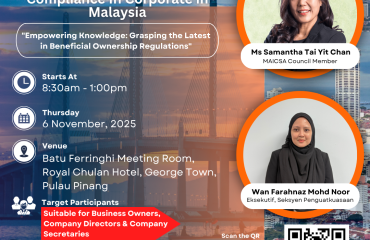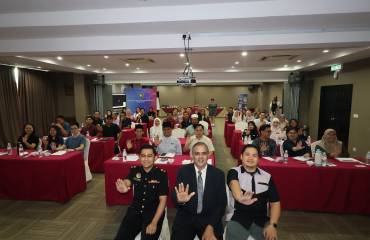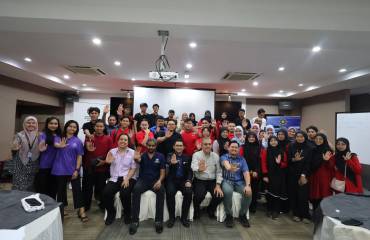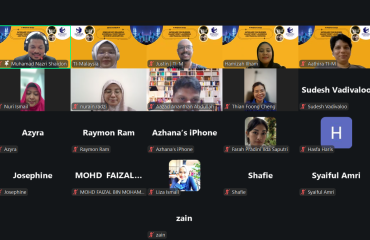
10 December 2010
Issued in conjunction with the worldwide launch of the Transparency International Global Corruption Barometer (GCB) 2010.
Malaysia’s 2010 GCB results
The GCB surveys the general public worldwide for their experience, views and perceptions of corruption in their country, including views on the government’s efforts in fighting corruption. In Malaysia a face-to-face survey was conducted of around 1,000 members of the public in urban and rural areas.
The police were perceived to be the most corrupt (4.1/5.0), followed by political parties (4.0/5.0) and Parliament (3.4/5.0).
With respect to the level of corruption in the previous 3 years, 46% of the respondents thought that the level of corruption had increased, 35% thought it was the same, and 19% thought it had decreased. In 2005, 46% of the respondents thought that the level of corruption had increased, 29% thought it was the same, and 25% thought it had decreased.
With respect to the level of corruption in the next year, 27% thought the level of corruption will increase, 41% thought it will stay the same, and 25% thought it will decrease (7% did not know or did not respond).
However, the positive perception of the government’s actions in fighting corruption has jumped: 48% thought the government’s actions are effective, 32% were neutral, while 20% thought the government’s actions are ineffective. This is a drastic turnaround from the previous year: 28% thought the government’s actions were effective, 6% were neutral, while 67% thought the government’s actions were ineffective. 48% substantially exceeds the government’s KPI of 37%, though the government did not achieve it’s KPI of CPI score of 4.9 as Malaysia’s CPI 2010 score is 4.4 (almost the same as previous year’s score of 4.5).
This positive perception could be due to the government’s initiatives to address corruption:
• Integrity as a National Key Result Area (NKRA), with improvement of the Corruption Perception Index (CPI) score from 4.5 to 4.9 as a Key Productivity Index
• Formation of the Malaysian Anti Corruption Commission (MACC) with more powers and autonomy and review by independent panels
• The Whistleblower Protection Act – to come into force on 12 December 2010, to expose corruption by protecting whistleblowers (and for Malaysia to meet its obligations under the UN Convention Against Corruption (UNCAC))
• TI’s Integrity Pacts (IP) to be implemented in government procurement (Treasury directive dated 1 April 2010)
• Government guidelines on “Support Letters” (8 March 2010): verbal and written support letters must be filed and reported, support letters cannot be a factor in decision making, and reports are to be made to the department or relevant agencies eg MACC
• MyProcurement website (1 April 2010) – awarded tenders
• Formation of 18 special corruption courts and amendments to the Criminal Procedure Code to expedite corruption trials, currently in progress
• “Name and shame” in the Convicted Corruption Offenders Database on MACC’s website, with convicted offenders’ details, charge and sentence imposed and photographs
• Establishment of compliance units in key enforcement agencies – Royal Malaysian Police, Road Transport Department, Royal Malaysian Customs Department, Immigration Department of Malaysia and Malaysian Anti-Corruption Commission.
Although there are good initiatives and the public’s confidence in the government’s actions to fight corruption has jumped, there are unfortunately indications of insufficient political will to eradicate corruption. For example: no “big fish” being brought to book, poor progress in identifying and prosecuting culpable persons in the Port Klang Free Zone (PKFZ) fiasco, No Further Action by the Attorney-General against those implicated in judicial appointment tampering (“Lingam tapes”) despite the Royal Commission’s findings and recommendations, the continuing and snowballing practice of awarding mega projects and contracts without open tenders or competitive bidding, and IPs yet to be implemented.
We suggest that the government can take further initiatives such as:
• Making the MACC more independent and autonomous to reinforce the rule of law that no one is above the law – it should report directly to a Parliamentary committee, and also be given prosecution powers
• Reforming political financing and regulation of political parties and elections, and public disclosure of politicians’ assets
• Promoting freedom of information by repealing or drastically curbing legislation such as the Official Secrets Act, Sedition Act and Printing Presses and Publications Act
• Effective and vigorous enforcement of existing laws and policies, including money laundering and transfers by suspects in high profile corruption cases.
TI-M reiterates its call to the government to show strong political will “without fear or favour” to vigorously fight corruption. Given Malaysia’s aspiration to be a high income and developed country by the year 2020, the commitment to fight corruption must be clear and firm. Malaysia’s quest for a high income economy will fail if corruption persists. A high income economy can only be achieved where there are efficient delivery systems, where the organs of government and institutions govern and manage the country and its resources professionally, responsibly and with integrity, transparency and good governance, in the interest of the nation and its citizens.
Datuk Paul Low
President
Transparency International Malaysia
Please click below for a sample of the questionnaire used:
2010 GCB Questionnaire
For the report on the main findings of the GCB at an international level:
2010 GCB Report – International
For the presentation slides for Malaysia’s GCB performance:









